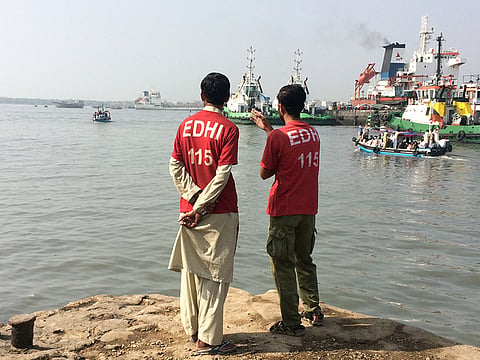A humanitarian legacy
The Edhi Foundation is an organisation that helps thousands of Pakistanis and is also home to the world’s largest volunteer ambulance network

In July, Pakistan marked two years since the death of Abdul Sattar Edhi, the man often described as the world’s greatest humanitarian. The organisation he founded bears his name, the Edhi Foundation. In a country with scant public welfare system, it provides cradle-to-the-grave care for those who need it most.
The Edhi Foundation fills a number of gaps left by the state. It runs the world’s largest volunteer ambulance network — a fleet of 1,500 across the country, whose drivers are always the first on the scene at any accident, natural disaster or terror attack.
It also runs homeless shelters, women’s refuges and orphanages; cheap doctors’ services and pharmacies, rehab centres, maternity clinics and mortuaries.
Humble beginnings
This charitable empire began organically. Edhi was born in 1928 in Gujarat, before the Partition of India and Pakistan. He moved to Pakistan six days after the new country was formed in 1947, arriving by boat in the southern city of Karachi. Back then, it was a port town of around 450,000.
Today, it is a sprawling megacity of over 20 million people, the centre of ethnic strife, gang violence, and problems common to many rapidly growing cities in the developing world: poverty and poor infrastructure.
Initially, Edhi worked as a street trader, but, in his own words, felt the urge to do welfare work after “observing the environment I was living in, where injustice, bribery and robbery were common”. He set up his first simple pharmacy offering drugs and basic medical care, regardless of people’s ability to pay, in a tent next to his family home in Karachi.
In 1957, he asked for donations to expand his work when a flu epidemic hit the city. Soon after this, a generous donation allowed him to buy his first ambulance. From there, the organisation expanded into the multimillion dollar enterprise that it is today.
I first spent substantial time with the Edhi Foundation in 2016, a few months after its founder had died. In the public imagination, the organisation had long been synonymous with Edhi and his long white hair and beard.
He was famous for his humility. Right until the end, he kept his hands dirty, never assuming the role of a distant and wealthy boss. He took part in rescue work, broke bread with the ambulance drivers, and sat outside the foundation’s main Karachi office with a begging bowl to solicit donations.
He was known to refuse donations from big businessmen or companies that he deemed unethical. After his death, various commentators within Pakistan questioned whether the foundation would be able to continue.
Still going strong
Sure enough, donations dropped by 30 per cent. But, two years later, the foundation is still going strong. Leadership of this vast charitable enterprise was passed onto Faisal Edhi, the founder’s son.
Faisal was raised in this organisation. He recalls his father taking him to help in the aftermath of a terror attack when he was just ten years old, and the shock he felt seeing body parts scattered around.
In life, the elder Edhi had faced criticism for being insufficiently religious. He was a committed socialist with a background in Marxist politics. He refused to discriminate on religious grounds, offering equal treatment to Hindus, Christians and Muslims.
Given this backdrop, Faisal was philosophical about the drop in donations and the speculation that the organisation would struggle without his father’s leadership. “When my father was alive and people would criticise him, he used to say, ‘We do not need to respond, our response is our work’,” he told me. “So that’s what I say now. Our response is our work.”
In able hands
Earlier this year, I returned to the Edhi Foundation, spending several weeks filming a short documentary about their work collecting Karachi’s unidentified dead.
These bodies turn up on the streets, sometimes the victims of political violence or, now that the security situation has improved, drug addicts or migrant labourers from elsewhere in Pakistan.
They are the victims of urbanisation at its most unforgiving, far away from loved ones and stripped of their identity. The Edhi Foundation strives to find their families and, if this is not possible, gives them a full religious burial.
When I first visited the graveyard for the unidentified dead in 2016, there were over 83,000 people buried there. When I returned in 2018, the number was over 85,000. On this second visit, the graveyard was more overgrown and unkempt: a symptom, staff said, of reduced budgets.
But Faisal and the rest of the Edhi team remain committed to their work. Adjacent to the Edhi mortuary where these unidentified dead were kept is a children’s home.
One day, I accompanied Faisal there to help plant some tamarind trees. As we walked through the grounds, children greeted Faisal as if he were a family member. He bent down to bury the tamarind shrubs into the terracotta earth. “As long as people need us, we will carry on,” he said.



